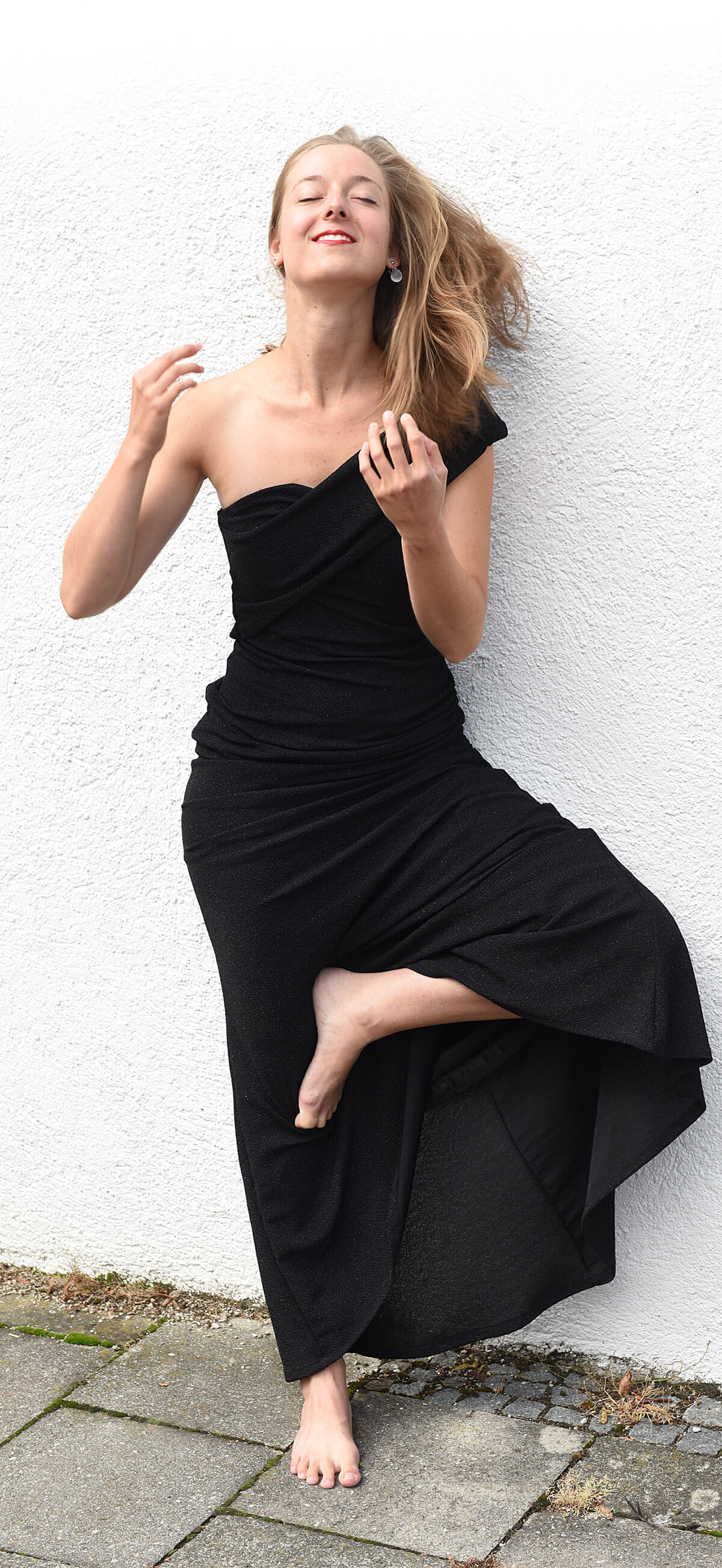Life
After 13 years on the opera and concert stage, mezzo-soprano Rebekka Bigelmayr is increasingly at home in the field of solo improvisation. She sets texts inspired by the moment and ideas of the performance venue to music in her individual expression and sound format. Depending on the context, the sound arts range from noises to breath sounds to large classical scales and improvised phrases. Thus she opens a new untrodden space of momentary recording of a situation, set to music and enveloped in the sound of her voice. Most recently, she embodied the "Muse of Music" at the Fontane Festival in Neuruppin in 2023, accompanying herself on the piano to Handel's famous arias with improvisation and texts. As a performance artist, she has been a guest at the Pasinger Fabrik in Munich, the Literature Archive in Marbach, the Oberammergau Museum on the occasion of the Passion Play 2022 and the Museum am Dom in Würzburg, among others.
She was inspired for this extraordinary kind of artistic work at the University of Music and Performing Arts in Stuttgart, where she studied New Music with Angelika Luz Konzertexamen. At the same time she made her debut with an aria matinee at the Mozartfest Würzburg. There she sang, among others, the arias of Rossini's "Cenerentola" and Mozart's "Donna Elvira". With the pianist Doriana Tchakarova she gave self-conceived song recitals entitled "Schubert and his Mysticism". In addition to her love of mezzo coloratura, she performed the alto part of Franz von Suppé's Requiem with the Göttingen Symphony Orchestra and the Northwest German Philharmonic Orchestra. She made her debut at the Landestheater Detmold in the role of Paoluccia in Niccolò Piccini's "La buona figliuola". At the Fontante Festival near Berlin she impersonated the character of Cécile von St. Arnaud as an actress as well as a singer. She was directed by Frank Matthus, under whom she also made her debut in 2018 at the Kammeroper Schloss Rheinsberg (guest performance/Estonia) in the world premiere of "A Bad Man's Life" by Marc-Aurel Floros. At the Theater Bielefeld she was heard with the Stabat Mater by G.B.Pergolesi. Other roles on stage were the Dachshund (Das schlaue Füchslein/Janáček), Ghost (Cendrillon/Massenet), excerpts from Samuel Barber's "Vanessa" as Erika, Benjamin Britten's "Albert Herring" as Nancy, Igor Stravinsky's "The Rake's Progress" as Baba and Hans Werner Henze's "Prinz von Homburg" as the Electress. She also conceives her own productions. She put together the secular solo cantata "O numi eterni - Lucrezia" by George Frideric Handel with basso continuo accompaniment as a complex hour-long performance with solo singing, contemporary dance and electroacoustics. Texts written by the singer herself gave the piece that special something, both from tape and spoken live.
She attracted particular attention with the piece Sequenza III (1966) by Luciano Berio, which she expanded and staged performatively as a post-war work. With this piece, she won first place in the "Musik & Vermittlung" competition in Detmold in 2018. At the beginning of her singing career, she was first awarded the special prize for contemporary music in the "Jugend musiziert" competition for the "Berio Sequenza". Invitations from the Bavarian Radio to Nuremberg and to the Allerheiligen Hofkirche of the Munich Residenz followed. Again for her outstanding engagement with New Music, she was honored in 2017 with a special prize at the Interpretation Competition of the Detmold University of Music.
She was a semi-finalist at the 2018 National Singing Competition at the Berlin University of the Arts.
Likewise, the mezzo-soprano maintains a regular concert activity. Special treasures, such as the Requiem by Maurice Duruflé, the Stabat Mater by Joseph Haydn and Giovanni Battista Pergolesi enrich her repertoire. In addition, there are all Mozart masses, as well as the oratorios and passions of Johann Sebastian Bach.
With a love of lesser-known works, she participated in the world premiere at the Theater Gütersloh and the CD production at CPO of "Wilden Schwäne" by Carl Reinecke under the direction of Peter Kreutz. She sang several world premieres of song cycles composed especially for her by the young composer Max-Lukas Hundelshausen.
Among her most important teachers are Susanne Winter, Dorothea Geipel, Angelika Luz and Margreet Honig. During her studies, Rebekka Bigelmayr was a scholarship holder of the Society of Friends and Sponsors of the Detmold University of Music for several years and a scholarship holder of the City of Stuttgart.

